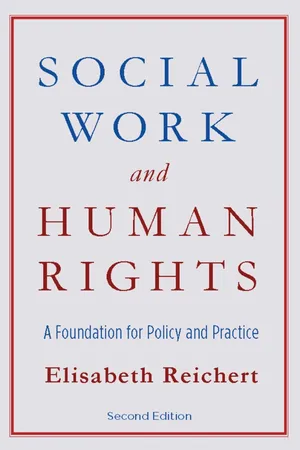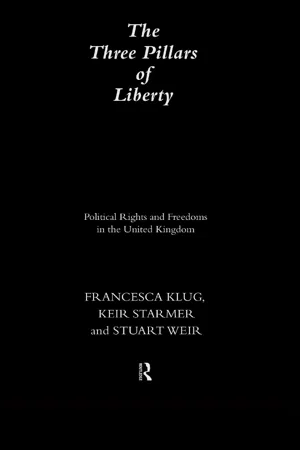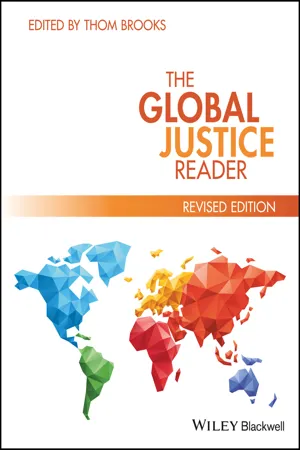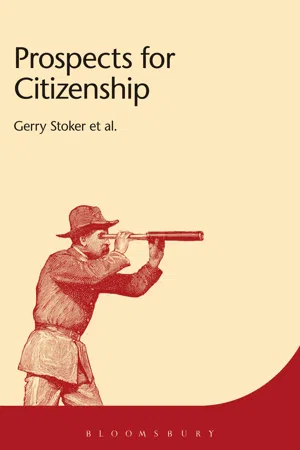Politics & International Relations
Civil rights UK
Civil rights in the UK refer to the rights of individuals to be treated equally and fairly, regardless of their race, gender, religion, or other characteristics. These rights are protected by laws and regulations aimed at preventing discrimination and promoting equality. The UK has a history of civil rights movements and legislation aimed at addressing inequalities and promoting social justice.
Written by Perlego with AI-assistance
Related key terms
6 Key excerpts on "Civil rights UK"
- eBook - ePub
Social Work and Human Rights
A Foundation for Policy and Practice
- Elisabeth Reichert(Author)
- 2011(Publication Date)
- Columbia University Press(Publisher)
The International Covenant on Civil and Political RightsIn 1976, a sufficient number of member countries of the United Nations had ratified (or approved) the International Covenants on Civil and Political Rights and Economic, Social, and Cultural Rights to put the covenants into force within the approving countries. A UN covenant takes effect only after a specified number of member countries of the United Nations have approved it. Countries approving the covenant are then legally bound to enforce its provisions. Only by signing and then formally approving a covenant does a country indicate its intent to be bound by it. Even then, unless a covenant states that it is “self-executing,” a country that has approved it must pass laws to enforce it. Neither the covenant on civil and political rights nor the covenant on economic, social, and cultural rights contains self-executing provisions. Although the United States has ratified the covenant on civil and political rights, the government has not enacted specific legislation to enforce it. Although many provisions in the covenant are similar to already existing laws in the United States, some of the provisions are new. Yet because the covenant is not self-executing, its provisions are not legally binding in the United States and thus makes reliance on the document a tenuous proposition. The remainder of this chapter addresses the provisions of the covenant on civil and political rights.Historically, the United States has paid much more attention to the human rights in the International Covenant on Civil and Political Rights than those in the International Covenant on Economic, Social and Cultural Rights. Indeed, this focus on political and civil rights has often led the United States to take a one-sided view of human rights, without adequately recognizing that human rights go beyond the political sphere. For U.S. social workers, this focus on political human rights may have led to a reluctance to study and integrate human rights into the social work profession. Yet, as will be evident in an analysis of the covenant, political and civil human rights also have a close connection to the profession’s interventions and principles.Introduction to the CovenantThe preamble or introduction to the International Covenant on Civil and Political Rights expressly lists civil and political rights that “derive from the inherent dignity of the human person” (see appendix B - eBook - ePub
- Rhoda E. Howard-Hassmann(Author)
- 2018(Publication Date)
- Polity(Publisher)
4 Civil and Political RightsThe Debate on Human Rights Priorities
Scholars often refer to three “generations” of rights, thought to reflect a philosophical hierarchy. In fact, the generations are merely chronological and reflect how Western rights-protective societies have developed, as well as reflecting late twentieth- and early twenty-first-century thought. The first generation, discussed in this chapter, is civil and political rights. The second generation is social and economic human rights, discussed in chapter 6 , and the third is collective rights, discussed in chapter 7 .Civil and political rights are those contained in the International Covenant on Civil and Political Rights. Like the Universal Declaration of Human Rights, the ICCPR is prefaced by a statement that “rights derive from the inherent dignity of the human person.” Also like the UDHR, the ICCPR (Article 2(1)) prohibits any distinction such as “race, colour, sex, language, religion, political or other opinion, national or social origin, property, birth or other status,” thus reaffirming that human rights are universal. This prohibition of distinctions based on social categories might be problematic for societies that routinely make such distinctions, as discussed in the last section of this chapter.Civil rights refer to rights of protection of physical security against the state, such as protection against torture (ICCPR, Article 7) and arbitrary execution (ICCPR, Article 6(1)). They also refer to due process rights, such as an individual's right to know the charges against him in case of arrest, his right to a fair trial, and his right not to be subjected to retroactive laws (ICCPR, Articles 14 and 15). These are often considered to be “negative” rights on the grounds that they require the state to forbear from abusive activities, but do not require it to invest any positive material resources in their fulfillment. This is erroneous: forbearance from torture, for example, requires material resources to ensure that police and prison guards are properly trained. Whether considered negative or positive, civil and political rights are rooted in the premise of the “unitary nature of misery,” and the evidence that “human beings do not want a life of suffering.”1 Critics who believe that civil and political human rights are “permeated by an atmosphere of selfishness,”2 - eBook - ePub
- Nicholas Bamforth, Peter Leyland(Authors)
- 2003(Publication Date)
- Hart Publishing(Publisher)
An awareness of civil libertarian principles greatly assists in identifying the appropriate way in which the courts should go about interpreting the HRA. It also allows a signalling to the judges, in a far more coherent fashion than has yet properly emerged, about when they can afford, indeed when they are obliged, to take an activist approach and when in contrast a certain restraint is called for. With the topic of civil liberties in this way retrieved from the margins, the chapter will conclude with some thoughts on the subject’s perceived vulnerabilities. It was these alleged weaknesses which gave rise to the perception of the need for the new discourse rooted in human rights in the first place, and so—having attempted freshly to rediscover the old subject within the new—the time is right in this chapter to revisit these supposed difficulties. It will be argued that these problems are in fact more apparent than real, and that they are in any event rather less severe than the difficulties that also circumscribe the concept of human rights.CIVIL LIBERTIES, ‘HUMAN RIGHTS’ AND THE ECHR
We start with the setting of parameters. Civil liberties is a discipline primarily engaged with the law and practice concerned with those freedoms which are essential to the maintenance and fostering of our representative system of government.1 At the very centre of such freedoms, the entitlement upon which the utility of the remaining liberties depend, and which gives them added zest and meaning, is the right to vote. Here we have an example of a civil liberty, indeed we would say the key civil liberty, which is realisable only through positive state action: our right to vote cannot exist in the abstract; it requires a large state machinery to make it work. Furthermore, a properly functioning representative democracy will insist that each vote carries a broadly equal weight, and will not permit certain affluent electors to buy the power to be heard at the expense of other interests; the electoral playing field should be an equal one. In contrast, other civil liberties are particularly valuable in that they make meaningful the exercise of this core right to vote, but they are reliant more on state inaction than action.The freedom to think for oneself, to believe what one wishes and to say what one wants are essential if a democratic assembly is going to be truly and properly representative. Their importance is, however, broader than this. Such civil liberties affect the general political atmosphere, the democratic health of the community, in a way which matters whether or not a vote is imminent or a voter likely to be influenced one way or the other. The right to associate with others and to assemble together are essential for the same reasons. Access to relevant information can also be seen to be an important civil liberty, both because the uninformed vote is a less effective one and because the discourse upon which a properly functioning democracy depends should be a well-informed one. Finally, it surely goes without saying that a state which arbitrarily kills, imprisons or tortures its citizens so chills the political atmosphere that it cannot be described as democratic, regardless of how free speech formally is or how regularly secret votes are polled: freedom cannot be constructed on such authoritarian foundations. Adherence to these core civil liberties produces an assembly that is both representative and accountable (through the ballot box and through the political energy that the prospect of the vote inspires) for the power that it exercises. It also guarantees a vibrant political community even at those times (the great majority) during which a vote is not imminent. Civil liberties also requires as a matter of basic principle that the relationship between the individual and the state be regulated by law, so some principle of legality is as essential to the subject as is a commitment to representative government. - eBook - ePub
The Three Pillars of Liberty
Political Rights and Freedoms in the United Kingdom
- Francesca Klug, Keir Starmer, Stuart Weir(Authors)
- 2003(Publication Date)
- Routledge(Publisher)
habeas corpus and an action in damages for false imprisonment. Unusually, the law makes no fundamental distinction between ‘public law’, governing acts of the state and its agents, and ‘private law’, regulating the relations between private citizens (at least as regards rights and remedies). Except in the case of certain Crown privileges, ordinary people can sue the state, or state officials, where their rights have been violated, just as they can sue private individuals.The rights of ordinary people in the United Kingdom are for the most part ‘negative’—that is, rights to be protected from interference from others, rather than positive rights, say, to publish a controversial article or to join a protest march. These rights can be modified or abolished by Parliament, whether they are founded in the common law or created by statute. For Parliament possesses the absolute power to make or un-make any law. Legally, individual citizens have no fundamental rights and no minimum standards apply. Liberties are what is left after the law has spoken. Equally, in theory at least, individual people are free to do as they like so long as they don’t break the law or infringe the rights of others.The human rights treaties or conventions which the United Kingdom has signed— such as the European Convention on Human Rights and the UN International Covenant on Civil and Political Rights—have not become part of the domestic law. Individual citizens have no remedy here in the United Kingdom for violations of these instruments, unless the rights and freedoms set out in them are already recognised in common or statute law. In the case of the European Convention, citizens can pursue a grievance to the European Court of Human Rights in Strasbourg, once they have exhausted the remedies open to them in this country. Parliament could incorporate international human rights instruments into domestic law by an Act of Parliament, but successive governments have chosen not to. In contrast, European Union law derived from the Treaty of Rome, as modified by the Maastricht treaty, becomes domestic law under the European Communities Act 1972. All the rights and duties provided for by EU law are given legal effect in this country. Accordingly, such fundamental rights as are recognised by the European Court of Justice can follow an oblique route into domestic law. - eBook - ePub
- Thom Brooks, Thom Brooks(Authors)
- 2023(Publication Date)
- Wiley-Blackwell(Publisher)
Basic Documents on Human Rights, 5th edn. Oxford: Oxford University Press, 2006.- United Nations. 1979. “Convention on the Elimination of All Forms of Discrimination against Women.” In I. Brownlie and G. Goodwin‐Gill (eds.),
Basic Documents on Human Rights, 5th edn. Oxford: Oxford University Press, 2006.- Weissbrodt, D. 2005. “Business and Human Rights.”
University of Cincinnati Law Review74: 55–73.Note
- Original publication details: James W. Nickel, ‘Making Sense of Human Rights’, pp. 35–52 (Chapter 3 ) from w, 2nd edn (Wiley Blackwell, 2007). Reproduced with permission of John Wiley & Sons.
Passage contains an image
9 Group Rights and Group Oppression
Peter JonesFor much of the twentieth century, political philosophy has regarded the proposition that groups can hold rights with a mixture of scepticism and suspicion. In recent years, however, that proposition has been received more favourably. In part this revival in the fortunes of group rights has stemmed from a resigned acceptance that some longstanding and widely espoused rights, such as rights of national self‐determination or rights to other forms of collective autonomy, cannot be convincingly disaggregated into the rights of individuals. It has also stemmed from new worries about the fate of ethnic and cultural minorities and from doubts about whether the concern and respect due to those minorities can be adequately secured merely by ascribing rights to their members individually. If a group enjoys a distinct mode of life and if that mode of life takes a collective form, perhaps our moral recognition of that mode of life has to be directed towards the group collectively rather than to its members severally. If we choose to express our concern for the group and its form of life in the language of rights, perhaps those have to be rights that we ascribe to the group qua group rather than to its members as separate individuals. - eBook - ePub
- Gerry Stoker, Andrew Mason, Anthony McGrew, Chris Armstrong, David Owen, Graham Smith, Momoh Banya, Derek McGhee, Clare Saunders(Authors)
- 2011(Publication Date)
- Bloomsbury Academic(Publisher)
CHAPTER FIVECitizenship and the Politics of Rights
This chapter will explore the tension between what I will call ‘civic rights’ (meaning here the rights of citizenship) and human rights in the context of domestic politics. It will be suggested in this chapter that the recent debates and proposals for a Bill of Rights in the UK are the site for the emergence of a clash between two types of politics – ‘a politics of citizenship’ and a ‘politics of human rights’ – in which the ‘dual commitments of liberal democracies, that is, to international human rights and collective self determination’ (Benhabib 2001 : 363) are in tension. Rather than leading to ‘the emergence of a deterritorialised and postnational politics’ in which legally codified human rights are to be privileged over citizenship (Tambakaki 2010 : 3–4), these debates on the potential Bill of Rights in the UK were played out within the frame of ‘a Westphalian political imaginary’ (Fraser 2008 : 12). It is in the debates on what a Bill of Rights could do for Britain that the tensions between privileging human rights over citizenship, as well as law over politics, are exposed (Tambakaki 2010 : 8). This tension between the universal and the particular, with regards to civic rights and human rights, is part of what Žižek refers to as ‘the rebirth of the old distinction between human rights and the rights of citizens’ which involves the process of narrowing the rights of citizens (2002: 95) through repackaging the political rights of citizens as a mere ‘secondary gesture’ (Žižek 2002 : 95). This can be observed in the debates on the conditional relationship between rights and responsibilities; however, in this chapter, the primary focus will be on processes of radical exclusion under the ‘war on terrorism’ where the treatment of foreign-born ‘terrorist suspects’ can be best described in Arendtian terms as a matter of deciding who has ‘the right to have rights’ in the name of public safety (McGhee 2008 , 2010 ). In this chapter the tension between ‘civic rights’ and ‘human rights’ will be examined through examining what the recent Labour Government and Conservatives (whilst in Opposition) had to say about the potential Bill of Rights with regards to the relationship between: (a) human rights and ‘public safety’; (b) rights and responsibilities; and (c) the need to bolster what is perceived to be a weak sense of citizenship in contemporary Britain. In many ways this chapter is an examination of what Nancy Fraser, in her book Scales of Justice
Learn about this page
Index pages curate the most relevant extracts from our library of academic textbooks. They’ve been created using an in-house natural language model (NLM), each adding context and meaning to key research topics.





